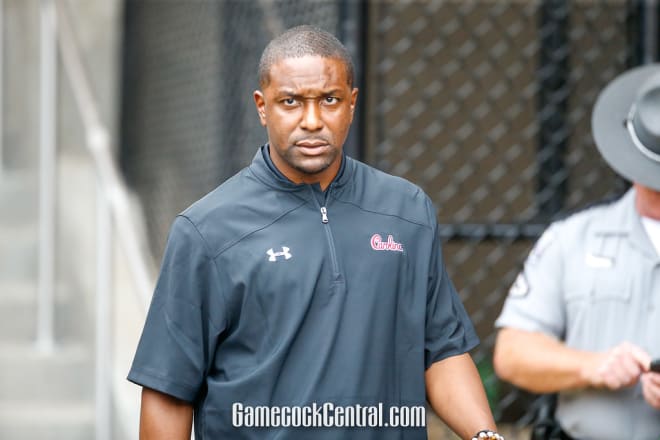A deeper look at offensive struggles
SOUTH CAROLINA GAMECOCKS FOOTBALL
This season has been a lesson in futility for South Carolina and its offense with one forgettable performance after forgettable performance, and those struggles came to a head Saturday night.
Again shorthanded and again unable to piece together any semblance of offensive consistency, the Gamecocks put up a season-low six points against Texas A&M as they earned their fifth game by double-digits.

“It’s frustrating. It’s frustrating for our kids. We need to do a better job for them. We obviously need to execute and play better,” Will Muschamp said. “But you can’t stay on the field offensively at all and can’t get anything going in the run game. We’re having a hard time piecing anything together offensively. I thought our kids played hard and gave effort. We didn’t play very well, especially on the offensive side of the ball.”
Also see: Instant analysis from Saturday's loss
The six points were the fewest in a regular season game since 2009 when they scored six against Alabama, and it could have been worse. The Gamecocks kicked a garbage time field goal after recovering a fumble in Texas A&M territory.
They averaged 4.1 yards per play and put up just 102 yards after halftime on 34 plays. Of their 63 plays, only 40 percent were run in opponent territory, and three of the 13 drives started in South Carolina territory and ended on the other side of midfield.
It’s been a consistent problem for the Gamecocks, who lost hope for bowl eligibility with the loss, but a change isn’t going to happen until at least after the season.
Muschamp said Saturday night he still anticipates offensive coordinator Bryan McClendon calling plays Nov. 30 against Clemson.
“We’ll move forward like we have been and figure out what we need to do to be productive," he said.
Also see: Everything Will Muschamp said postgame
Saturday night’s offensive debacle wasn’t an anomaly on the season, it’s become the norm for South Carolina this season.
The Gamecocks finish SEC play averaging 19.9 points, 5.7 yards per passing attempt, four yards per carry and 4.9 yards per play. They finish with a losing record in conference play for the first time since Muschamp’s first season in 2016.
Over their last four games, the offense is averaging 16.5 points, being held to under 20 points in back to back games, and averaging 4.6 yards per play. They’re 1-3 in those games.
Over their last three games, they've had 36 drives and scored on 10 of them, just four touchdowns. They're averaging less than two points per drive.
“Just not being able to get in a rhythm,” Kyle Markway said. “We go out there and make a few plays but we need to be more consistent with it. We need to run the ball better, and that opens up our offense more.”
A unit that’s established itself as a running team hasn’t run the ball well the last few weekends. They’ve been held under 100 yards on the ground in their last three losses.
They’re averaging 2.3 yards per carry the last four games and have seemingly gone away from their bread and butter, attempting 186 passes the last four weeks to 123 rushing attempts.
The offense ran the ball just 17 times against the Aggies for 45 yards, compared to 46 pass attempts.
“We felt like we had some things in the run game,” Muschamp said. “We had a hard time blocking them the last two years and knew that was going to be an issue creating things in the run game. We had a hard time creating anything explosive and getting people off of us. It’s very difficult right now."
Also see: Latest on a Rivals150 player eyeing a Gamecock visit soon
Things are starting to take a toll as the Gamecocks struggle to do anything consistently on offense, and it reflects in the record.
While losses pile up, Bryan McClendon hasn’t been made available to the media under Muschamp’s policies of not allowing assistants to talk to the media during the season.
He has to answer those questions and is spreading blame across the entirety of the unit.
“Overall we just have to get better. Bottom line,” he said. “We’re not going to blame it on one person.”

